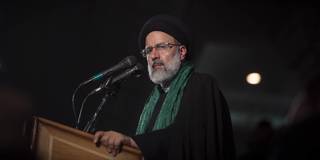Sayyid Ebrahim Raisi’s victory in Iran’s presidential election places all of the country’s levers of power in the hands of regime hardliners for the first time in decades. But behind the apparent consolidation of power, domestic turmoil looms as the country's structural challenges worsen.
PALO ALTO – Iran’s presidential election on June 18 was the most farcical in the history of the Islamic regime – even more so than the 2009 election, often called an “electoral coup.” It was less an election than a chronicle of a death foretold – the death of what little remained of the constitution’s republican principles. But, in addition to being the most farcical, the election may be the Islamic Republic’s most consequential.
The winner, Sayyid Ebrahim Raisi, is credibly accused of crimes against humanity for his role in killing some 4,000 dissidents three decades ago. Amnesty International has already called for him to be investigated for these crimes. Asked about the accusation, the new president-elect replied in a way that would have made even George Orwell blush, insisting that he should be praised for his defense of human rights in those murders.
Never has such a motley crew been chosen to act as a foil for its favored candidate. The regime mobilized all of its forces to ensure a big turnout for Raisi, who until the election was Iran’s chief justice. Supreme Leader Ayatollah Ali Khamenei decreed voting a religious duty, and casting a blank ballot a sin, while his clerical allies condemned advocates of a boycott as heretics. But even according to the official results, 51% of eligible voters did not vote, and of those who did, more than four million cast a blank ballot. There are already allegations that the announced numbers were doctored, and a powerful movement to boycott the election has already declared the outcome a virtual referendum against the status quo.

PALO ALTO – Iran’s presidential election on June 18 was the most farcical in the history of the Islamic regime – even more so than the 2009 election, often called an “electoral coup.” It was less an election than a chronicle of a death foretold – the death of what little remained of the constitution’s republican principles. But, in addition to being the most farcical, the election may be the Islamic Republic’s most consequential.
The winner, Sayyid Ebrahim Raisi, is credibly accused of crimes against humanity for his role in killing some 4,000 dissidents three decades ago. Amnesty International has already called for him to be investigated for these crimes. Asked about the accusation, the new president-elect replied in a way that would have made even George Orwell blush, insisting that he should be praised for his defense of human rights in those murders.
Never has such a motley crew been chosen to act as a foil for its favored candidate. The regime mobilized all of its forces to ensure a big turnout for Raisi, who until the election was Iran’s chief justice. Supreme Leader Ayatollah Ali Khamenei decreed voting a religious duty, and casting a blank ballot a sin, while his clerical allies condemned advocates of a boycott as heretics. But even according to the official results, 51% of eligible voters did not vote, and of those who did, more than four million cast a blank ballot. There are already allegations that the announced numbers were doctored, and a powerful movement to boycott the election has already declared the outcome a virtual referendum against the status quo.